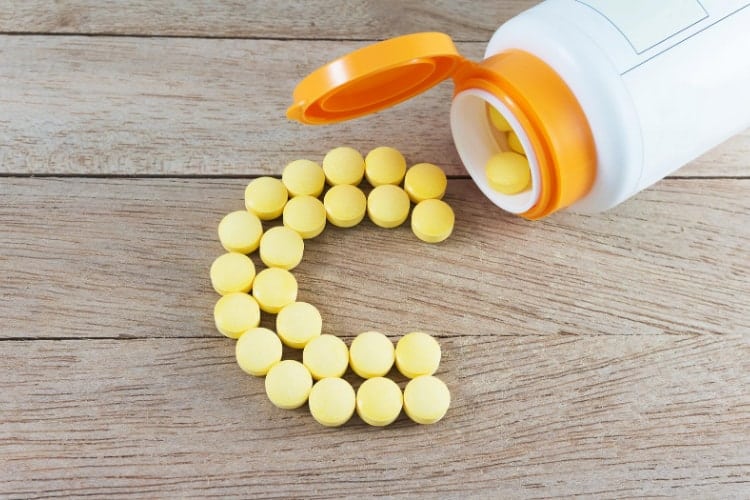
There are two main reasons why you might want to consider using vitamin C for heavy menstrual bleeding (aka menorrhagia):
- First, it strengthens capillaries.
- Second, it improves iron absorption.
At first glance, this may not seem like much. But research suggests that these two benefits could play an important role in alleviating excessive period bleeding.
Now, to help you make sense of all this, we’re going to discuss the science of how vitamin C helps heavy menstrual cycles, how to use it and what to look for when buying vitamin C supplements.
Note: this post contains affiliate links and I earn a commission (at no additional cost to you) if you use them to make a purchase.
HOW VITAMIN C HELPS TO REDUCE HEAVY PERIODS (WITH CLOTS)
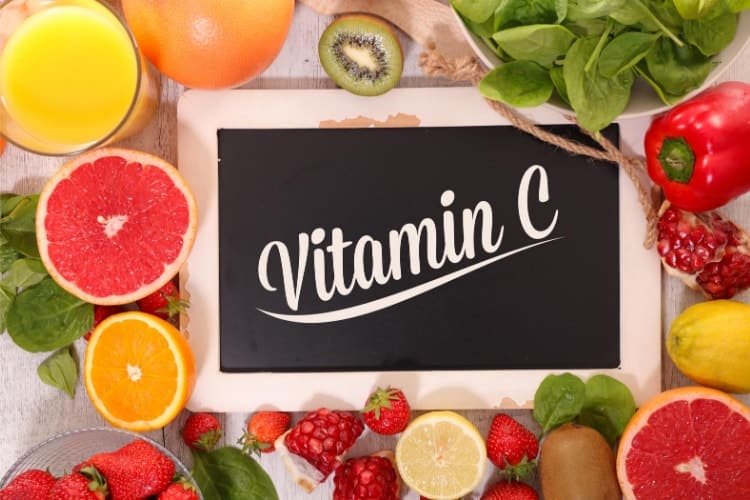
Finding concise and reliable information on how or why vitamin C helps heavy periods isn’t easy. Luckily though, this medical review from 2007 covers the essentials and it’s the basis of everything we’re going to discuss in this section.
Now, the main thing to note from that review is this: the combination of vitamin C and bioflavonoids is what provides the best results for heavy periods.
Now, if you’re not familiar with bioflavonoids, they’re antioxidants found in fruits, veggies and even dark chocolate.
In nature, bioflavonoids are present wherever vitamin C is present.
And that’s probably not a coincidence because it turns out that bioflavonoids enhance vitamin C’s therapeutic benefits (source).
As for how vitamin C with bioflavonoids helps with excessive menstrual flow, there are two main things that contribute to this: improved capillary strength and improved iron absorption.
1. Strengthens Capillaries
Several studies suggest that abnormalities related to the structure, function or the total number of endometrial blood vessels can contribute to heavy periods (source).
And one reason why these abnormalities may occur is due to a malfunction in a process known as angiogenesis.
So, what is angiogenesis? Well, it’s basically the formation of new blood vessels.
And it’s a process that occurs in the endometrium during different phases of the menstrual cycle.
Now, even though angiogenesis is a natural process, there can sometimes be abnormal or incomplete angiogenesis.
And this can cause the blood vessel walls to be weak and delicate.
Ultimately, those fragile vessel walls could more easily burst, resulting in significant blood loss.
So, one way to strengthen those blood vessel walls is to take vitamin C with bioflavonoids.
This particular combo has been shown to strengthen capillaries (which are tiny blood vessels) and help alleviate a heavy flow.
Note: problems with angiogenesis is just one of many reasons why capillaries can be weak. Another reason could be inflammation related to an increase in hormones known as prostaglandins. High levels of prostaglandins could affect blood clotting and the overall balance of endometrial processes (1, 2).
2. Improves Iron Absorption
Low iron (and eventually, anemia) is one of the major side effects of excessive menstrual bleeding.
And unfortunately, anemia can contribute to thyroid problems that keep you stuck in a vicious cycle of heavy periods!
Here’s a breakdown of what I mean (3, 4):
- Iron is necessary for the production of TSH (thyroid stimulating hormone). TSH triggers the thyroid to produce thyroid hormones.
- Without sufficient iron, TSH production and thyroid hormone production are both compromised.
- Since the thyroid plays a role in regulating the menstrual cycle, any imbalance in thyroid function could contribute to heavy periods (and other menstrual irregularities).
So, how does vitamin C fit into all this?
Well, vitamin C boosts the body’s absorption of iron.
So, whether you’re getting your iron from food, supplements or both, having enough vitamin C in your diet can help you absorb more of that iron.
HOW TO USE VITAMIN C WITH BIOFLAVONOIDS FOR A HEAVY MENSTRUAL FLOW
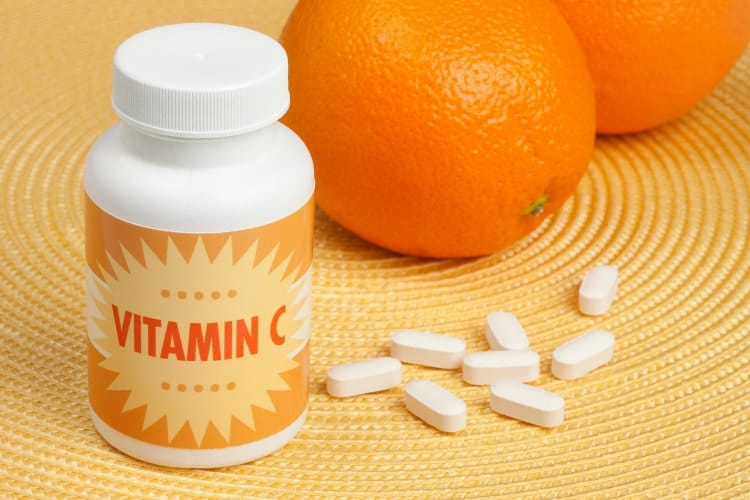
When it comes to how much vitamin C to use for menorrhagia, it’s hard to find a reliable dosage.
Several websites cite this study (from 1960) which supposedly provides a suggested dose. However, while that study clearly is real, the text isn’t available online.
So, without an actual study that I can point you to, here are some options to consider (and definitely discuss with your doctor first):
- You can try taking up to 2000 mg per day since that’s the upper limit for vitamin C (source).
- Go with the manufacturer’s suggested dosage for whichever brand you buy.
- Talk to a doctor who is well versed in alternative therapies and ask them for a recommended dosage.
HOW TO CHOOSE VITAMIN C SUPPLEMENTS FOR EXCESSIVE PERIOD BLEEDING
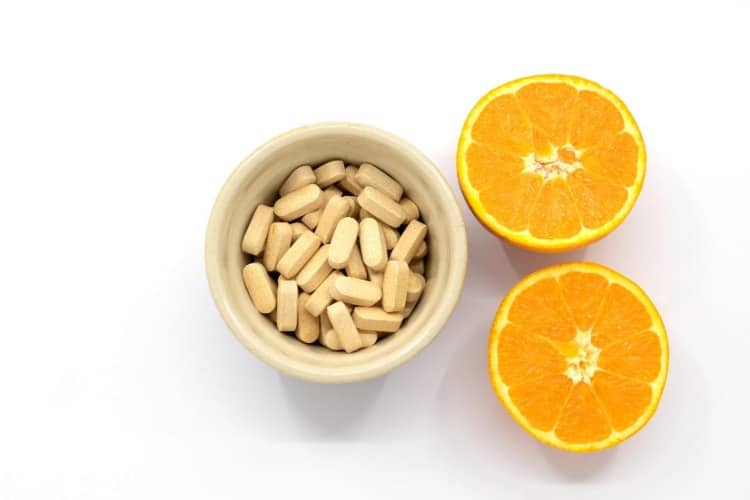
When buying a supplement, vitamin C is usually listed in the ingredients as ascorbic acid.
Here are a few things to note about ascorbic acid (source):
- There are both natural and synthetic forms of ascorbic acid.
- Both forms are chemically similar.
- There are also mineral ascorbates, such as calcium ascorbate, sodium ascorbate, potassium ascorbate and others. These are marketed as being gentler on the digestive system than plain ascorbic acid. However, there’s no clear evidence to support or contradict these claims.
- The bioavailability of ascorbic acid seems to be the same regardless of whether the supplement is in the form of a powder or tablets (chewable and non-chewable).
Overall, plain ascorbic acid is very affordable, easy to find and most brands sell it with bioflavonoids included.
Now, as you shop for vitamins, do keep in mind that ascorbic acid and vitamin c are not the same thing.
Ascorbic acid is a “reduced form” of vitamin C. This simply means that the vitamin C has gone through the reduction process and gained one (or more) electrons.
Also, be aware that in our food, vitamin C is found as a complex that contains bioflavonoids as well as (source):
- Ascorbinogen
- Ascorbic Acid
- Rutin
- Factor K
- Factor J
- Tyrosinase.
So, you’re better off getting your vitamin C in a form that is as close to natural as possible. But how do know which supplements will provide all this?
Well, one option is to use a powdered form of foods like acerola cherries, amla berries, pomegranate or camu camu. These are all foods that are high in vitamin C. So, when you buy them in powder form, you stand a better chance of getting the full vitamin C complex.
Here’s an acerola cherry powder that you can use in smoothies, protein shakes and more. It’s just the acerola cherries ground into a powder.
On the other hand, if you’re prefer a pill, then this raw vitamin C from Garden of Life is a good option. It’s made from a raw food complex and is also fermented. Fermentation enhances bioavailability (i.e. absorption), making this a good choice over non-fermented, synthetic forms of vitamin C.
Just keep in mind that whether you go for a plain ascorbic acid supplement or a whole food supplement, all supplements are meant to supplement your diet.
So, make sure to keep eating plenty of other nutrient-dense, vitamin C-rich foods…as well as iron-rich foods!
RELATED QUESTIONS ABOUT VITAMIN C AND HEAVY PERIODS
What herbs stop heavy menstrual bleeding?
Yarrow, shepherd’s purse and ginger are a few herbs that can be used for heavy periods. To learn more about these herbs, read this post on 10 herbs for heavy menstrual bleeding, as well as this one on the benefits of ginger root for heavy periods.
What vitamins should I take for heavy periods?
Aside from vitamin C, vitamins A and K can also be quite helpful for heavy menstrual cycles. In fact, one study found that vitamin A therapy improved menorrhagia in 92% of the participants. As for vitamin K, it’s necessary for blood clotting and has historically been used to alleviate a heavy flow (source).
CONCLUSION
With it’s ability to improve iron absorption and strengthen capillaries, taking vitamin C with bioflavonoids can be helpful in alleviating a heavy flow.
Just take some time to choose a good supplement brand so that you’re sure you’re getting what you pay for.
I hope this post was helpful and that you now have a better understanding of what your options are when it comes to vitamin C and your menstrual cycle.
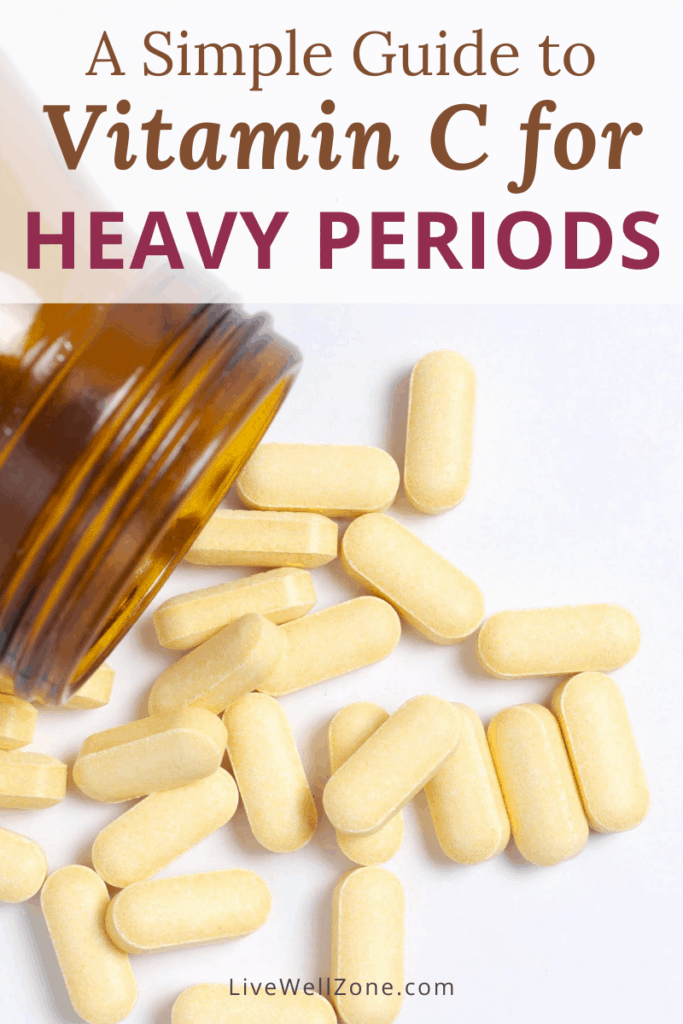
Related Posts:
3 Reasons To Use Blackstrap Molasses for Heavy Periods
A Complete Guide to Using Yarrow for Heavy Periods
5 Essential Oils for Heavy Periods That Provide Real Relief
Eating Dates For Iron Deficiency: Benefits, How Many To Eat and Best Types



That was good .i learnt a lot